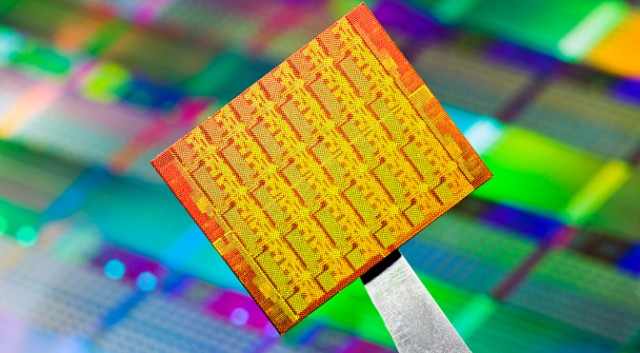AWS Trainium3: Leading the New Era of 3nm AI Chips
In the fields of cloud computing and artificial intelligence, Amazon Web Services (AWS) has once again achieved significant progress. Recently, AWS announced the launch of its first AI chip using 3nm process technology—Trainium3, which is expected to hit the market by the end of 2025. The release of this chip not only marks another milestone for Amazon in the field of AI chip development but also sets a new benchmark for the performance and energy efficiency of future AI workloads.
A Leap in Performance and Energy Efficiency
 The AWS Trainium3 chip has achieved significant improvements in both performance and energy efficiency. Compared to its predecessor, Trainium2, Trainium3's computing power has doubled, and its energy efficiency has increased by 40%. This progress is attributed to the application of 3nm process technology, which allows the chip to maintain high performance while more effectively controlling power consumption, extending device battery life, and reducing overall operational costs.
The AWS Trainium3 chip has achieved significant improvements in both performance and energy efficiency. Compared to its predecessor, Trainium2, Trainium3's computing power has doubled, and its energy efficiency has increased by 40%. This progress is attributed to the application of 3nm process technology, which allows the chip to maintain high performance while more effectively controlling power consumption, extending device battery life, and reducing overall operational costs.
The original intention of Trainium3's design is to meet the high-performance demands of the next generation of generative AI workloads, helping customers to build larger AI models more quickly and providing excellent efficiency when deploying models. According to AWS CEO Matt Garman, UltraServers powered by Trainium 3 are expected to be four times more efficient than those powered by Trainium 2.
Competitive Landscape of the AI Chip Market
In the AI chip market, NVIDIA has always held a dominant position. However, with the entry of cloud computing companies like AWS, this market landscape is undergoing profound changes. AWS has invested heavily in the field of AI chips, launching the Trainium series of chips and actively collaborating with major AI companies to promote innovation and application of AI technology.
Amazon's Trainium2 chips have already been recognized and used by companies such as Adobe, AI startup Poolside, data platform service Databricks, and chip giant Qualcomm. These successful cases not only prove the strength of AWS chips but also win more market attention and customer trust for AWS.
Apple's Collaboration with Amazon
 Among the customers of AWS chips, Apple is a notable presence. Apple announced that it will start using custom AI chips provided by Amazon Web Services (AWS) to enhance the intelligence of its products. Benoit Dupin, Apple's Senior Director of Machine Learning and Artificial Intelligence, stated that Apple will evaluate Amazon's latest Trainium2 chips as a pre-training solution for the "Apple Intelligence" model. This statement means that Apple is actively seeking more efficient and cost-effective AI solutions.
Among the customers of AWS chips, Apple is a notable presence. Apple announced that it will start using custom AI chips provided by Amazon Web Services (AWS) to enhance the intelligence of its products. Benoit Dupin, Apple's Senior Director of Machine Learning and Artificial Intelligence, stated that Apple will evaluate Amazon's latest Trainium2 chips as a pre-training solution for the "Apple Intelligence" model. This statement means that Apple is actively seeking more efficient and cost-effective AI solutions.
Future Outlook
As AI technology continues to develop and its application fields continue to expand, the demand for AI chips will continue to grow. The entry of cloud computing giants like AWS will further promote innovation and competition in the AI chip market. In the future, we can expect to see more high-performance AI chips like Trainium3, providing more efficient and convenient computing support for the development and deployment of AI applications.
At the same time, the development of the AI chip market also faces many challenges and opportunities. How to balance performance and power consumption, how to reduce costs, and how to meet the needs of different application scenarios are issues that require our in-depth thinking and resolution. Only through continuous innovation and breakthroughs can we promote the AI chip market towards a more prosperous and sustainable development path.
In summary, the launch of Amazon's Trainium3 chip not only marks a significant breakthrough for AWS in the field of AI chip development but also provides more efficient and powerful computing support for the next generation of generative AI workloads. In the future, we can expect to see AWS achieve even more brilliant results in the AI chip market and bring more intelligent and convenient service experiences to users worldwide.
ConevoPLD Chips
Conevo is an independent ic component distributor, offers a wide range of ic chips(https://www.conevoelec.com/integrated-circuits-ics) such as plds, op-amp, embedded ics, memory, sensors, controllers and more. For more Conevo ics, click to see more.
● The EPM7256EGC192-2 is a high-performance, EEPROM-based programmable logic device (PLD) from the MAX 7000 family, featuring up to 5,000 usable gates, in-system programmability (ISP), and fast pin-to-pin delays of as low as 5 ns, making it suitable for a wide range of applications in digital logic design and implementation.
● The EPM5032DC is a high-performance, erasable programmable logic device (EPLD) from the MAX 5000 family, featuring 600 usable gates, fast 15-ns combinatorial delays, and configurable expander product-term distribution, suitable for a variety of digital logic design applications.
● The EPF81500GC280 is an FPGA (Field-Programmable Gate Array) from Intel/Altera, featuring 1500 FLIP FLOPS, 1296 logic elements, and configurable I/O operation for 3.3V or 5V, encapsulated in a PQFP-240 package.
Website: www.conevoelec.com
Email: info@conevoelec.com








